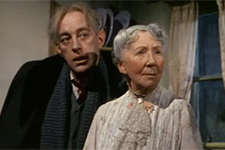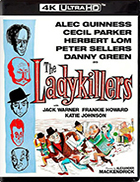The Ladykillers (1955) (4K UHD)
|  Alexander Mackendrick’s The Ladykillers is a delightfully macabre British comedy about a gang of professional criminals who meet their untimely demise because their plan is inadvertently foiled by a little old lady whom they simply cannot bring themselves to kill. The gang is led by the gargoyle-like Professor Marcus (Alex Guinness), who devises an intricate plan to rob two armored cars. The rest of the gang consists of men who have never met each other before (think a mid-’50s English Reservoir Dogs): The Major (Cecil Parker), an ex-military man turned con artist; One-Round (Danny Green), a hulking, but big-hearted lug of a man; Louis (Herbert Lom), a tough-talking Italian gangster; and Harry (Peter Sellers in his screen debut), a well-coifed teddy boy (Sellers and Lom would go on to play opposite each in five of Blake Edwards’s Pink Panther comedies). In need of a place to meet while working out their scheme, Professor Marcus rents two upstairs rooms in the rambling Victorian house of an elderly widow named Mrs. Wilberforce (Katie Johnson), who is quite chirpy and given to longwinded stories (she also owns two parakeets). Professor Marcus introduces his gang as an amateur orchestra in need of a place to play, and they all show up with string instruments and then huddle upstairs while a record player provides the music they are supposedly practicing. The first half of the movie is built largely around the comedy that ensues whenever Mrs. Wilberforce interrupts the criminals’ planning meetings (which is, by the way, very, very often). She knocks on their door constantly, asking in an exasperatingly sweet hum if they would like some tea, or some coffee, or if one of them would come downstairs to help her give medication to one of her pesky parakeets. One might wonder why the gang would put up with all of this, and it turns out that Professor Marcus’s plan relies on using Mrs. Wilberforce to pick up the £60,000 of stolen money at London’s Kings Cross Station (she, of course, has no idea what she’s involved in). They come within inches of getting away with the scheme, but Mrs. Wilberforce inadvertently finds out what they’re up to and demands (in her ever-so-sweet maternal cadence) that they simply must return the money and turn themselves in to the police. Professor Marcus and the others think that she can be reasoned with, but nothing doing: She is determined that they should come clean and that’s that. So, what’s left to do but off the old woman? Thus, the movie’s second half details the various attempts by the men to kill Mrs. Wilberforce, but they are constantly undermined by their own incompetence, their internal bickering with one another, and, most importantly, their general unwillingness to kill a sweet elderly lady. Mrs. Wilberforce’s house sits at the end of a dead-end street, and it couldn’t be a more appropriate location as the criminals end up killing each other off one by one in increasingly gruesome ways (all the violence is, of course, kept off screen, the bodies reduced to legs sticking out a wheelbarrow that must be dumped on trains that pass behind the house). When The Ladykillers works, it is brilliantly funny stuff. Screenwriter William Rose, who would go on to pen Stanley Kramer’s “comedy spectacular” It’s a Mad Mad Mad Mad World (1963) and his progressive racial drama Guess Who’s Coming to Dinner? (1967), finds an amusingly gruesome balance between the seriousness of the subject matter and its inherent absurdity. Alec Guinness, a consummate character actor, leads the way with his nasal-toned Professor Marcus, sporting a pair of deliciously obtrusive false teeth that are alone worth the price of admission; he comes across like a mad scientist posing as a doddery English professor. And, although she only starred in a handful of other films, Katie Johnson is the key to the film’s success, walking a perfect tightrope between being unbearably chipper and achingly vulnerable. Her Mrs. Wilberforce is both in complete control and utterly clueless about what she’s stumbled into. Just look at one of the film’s comedic high points, when she forces the criminals—whom she has already uncovered as such—to endure a longwinded afternoon tea with her group of gossipy friends. It’s a wonderfully droll scene in which the foxes are surrounded by a bunch of clucking chickens and can’t do anything about it. The Ladykillers was the last film to be produced at England’s famed Ealing Studios, which had been the home for such classics as Alfred Hitchcock’s The 39 Steps (1939) and Charles Crichton’s The Lavender Hill Mob (1951), before it was bought by the BBC and turned into a television studio. Director Alexander Mackendrick had only directed a handful of films at that point, all for Ealing, including the Alec Guinness comedy The Man in the White Suit (1951). After The Ladykillers he left England and started working in Hollywood, producing arguably his greatest film, the acerbic satire The Sweet Smell of Success (1957) with Burt Lancaster and Tony Curtis, before a steady decline that led him to leave the industry in the late 1960s for a position in the film department at the California Institute of the Arts. His deft touch in The Ladykillers is felt primarily in the performances, as the film itself is very much a stagy production—one could almost imagine it playing on a theatrical stage and not losing an ounce of effect. But, even if it lacks a true cinematic edge, The Ladykillers is still one of the funniest and most wicked British comedies ever made.
Copyright © 2024 James Kendrick Thoughts? E-mail James Kendrick All images copyright © Kino Lorber | |||||||||||||||||||||||||||||
Overall Rating: 


 (3.5)
(3.5)


